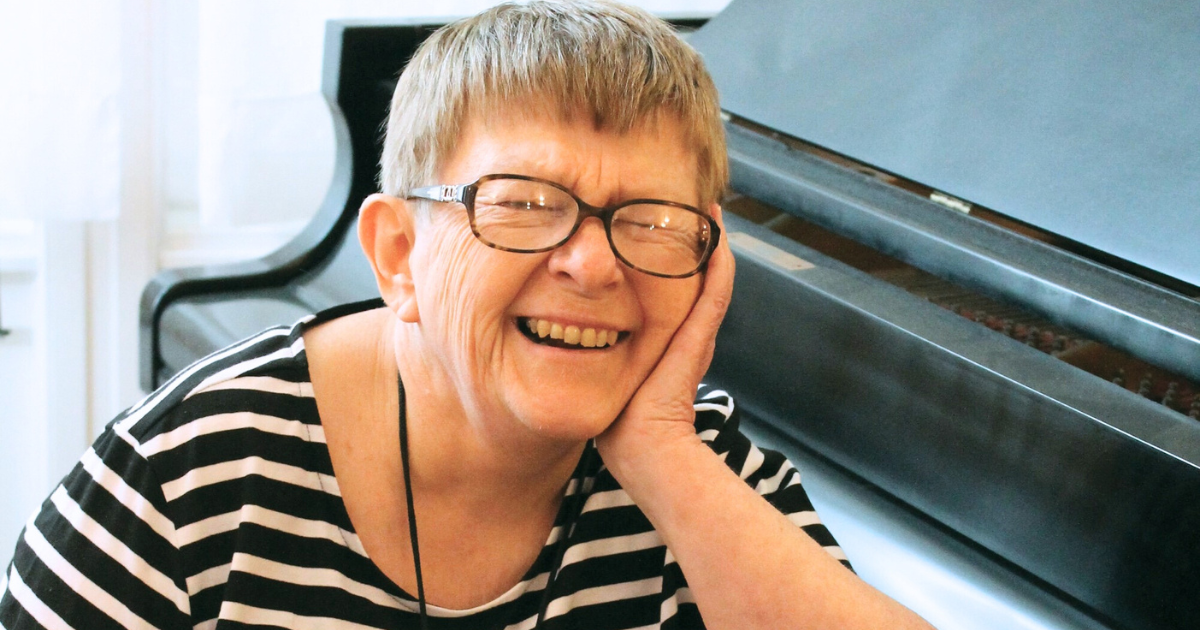Contributed by PWSA | USA Alterman Family Support Counselor Kim Tula, MS, CSW
Prader-Willi syndrome was first diagnosed in 1956; only 63 years ago. With supportive living and specialized care, we are now seeing individuals with PWS living longer and healthier lives. Susan Booth (Boothie) is one of those people. Susan was born March 18, 1950 and diagnosed with Prader-Willi Syndrome in 1963, at the age of 13. Susan recalls being told she had Prader-Willi syndrome and that she would “have to live with this for the rest of your life;” and that she has. On September 2, 1963, Susan moved to Riverbook Residence in Massachusetts. Today, Susan is 69-years-old and continues to live a happy and healthy life at Riverbrook Residence.
When asked, what has been the hardest part of having PWS? Susan stated, “Not having a lot of food in front of me.” Susan admits it has been a struggle staying away from food, staying out of the kitchens, and learning what foods are best for her. She states the most helpful thing for her has been having a supportive environment with the refrigerator and cabinets locked; removing the temptation for food.
As we are seeing individuals aging with Prader-Willi syndrome, many families, parents, and guardians are faced with the thought of placing their loved one in group homes or supportive settings. For Susan, living in a structured group home setting improved her quality of life by always providing her 24/7 support. The community Susan has grown up in has afforded her opportunities to live her life, not having to worry about access to food.
To keep herself healthy, Susan exercises as part of her daily routine. She walks on her treadmill every day, walks dogs, and enjoys going to Tai Chi at the local Senior Center. She also finds keeping herself and her hands busy throughout the day has helped her stay strong and healthy. Susan enjoys working on word puzzles, hook rugs, and knitting; she states she even taught Elizabeth Ruth to knit. She also keeps busy by working at Riverbrook on Main where she works on mailer. She is also active in her community church where she is a reader. For Susan, staying active and being involved in her community is very important and has helped her in living 69 years with Prader-Willi syndrome.
Susan’s advice to others with Prader-Willi syndrome is to “always keep busy with your hands, go for a walk, visit different places like parks and museums; stay active. Her advice to those who don’t have Prader-Willi syndrome is to help their loved ones by keeping them busy and taking them to different places.
Susan, how do you feel about being one of the oldest people with PWS? “I LOVE IT!! I am proud.”
What would you like others to know about you? “I would love to have a PWS pen pal.”





 Perry A. Zirkel has written more than 1,500 publications on various aspects of school law, with an emphasis on legal issues in special education. He writes a regular column for NAESP’s Principal magazine and NASP’s Communiqué newsletter, and he did so previously for Phi Delta Kappan and Teaching Exceptional Children.
Perry A. Zirkel has written more than 1,500 publications on various aspects of school law, with an emphasis on legal issues in special education. He writes a regular column for NAESP’s Principal magazine and NASP’s Communiqué newsletter, and he did so previously for Phi Delta Kappan and Teaching Exceptional Children. Jennifer Bolander has been serving as a Special Education Specialist for PWSA (USA) since October of 2015. She is a graduate of John Carroll University and lives in Ohio with her husband Brad and daughters Kate (17), and Sophia (13) who was born with PWS.
Jennifer Bolander has been serving as a Special Education Specialist for PWSA (USA) since October of 2015. She is a graduate of John Carroll University and lives in Ohio with her husband Brad and daughters Kate (17), and Sophia (13) who was born with PWS. Dr. Amy McTighe is the PWS Program Manager and Inpatient Teacher at the Center for Prader-Willi Syndrome at the Children’s Institute of Pittsburgh. She graduated from Duquesne University receiving her Bachelor’s and Master’s degree in Education with a focus on elementary education, special education, and language arts.
Dr. Amy McTighe is the PWS Program Manager and Inpatient Teacher at the Center for Prader-Willi Syndrome at the Children’s Institute of Pittsburgh. She graduated from Duquesne University receiving her Bachelor’s and Master’s degree in Education with a focus on elementary education, special education, and language arts. Evan has worked with the Prader-Willi Syndrome Association (USA) since 2007 primarily as a Crisis Intervention and Family Support Counselor. Evans works with parents and schools to foster strong collaborative relationships and appropriate educational environments for students with PWS.
Evan has worked with the Prader-Willi Syndrome Association (USA) since 2007 primarily as a Crisis Intervention and Family Support Counselor. Evans works with parents and schools to foster strong collaborative relationships and appropriate educational environments for students with PWS. Staci Zimmerman works for Prader-Willi Syndrome Association of Colorado as an Individualized Education Program (IEP) consultant. Staci collaborates with the PWS multi-disciplinary clinic at the Children’s Hospital in Denver supporting families and school districts around the United States with their child’s Individual Educational Plan.
Staci Zimmerman works for Prader-Willi Syndrome Association of Colorado as an Individualized Education Program (IEP) consultant. Staci collaborates with the PWS multi-disciplinary clinic at the Children’s Hospital in Denver supporting families and school districts around the United States with their child’s Individual Educational Plan. Founded in 2001, SDLC is a non-profit legal services organization dedicated to protecting and advancing the legal rights of people with disabilities throughout the South. It partners with the Southern Poverty Law Center, Protection and Advocacy (P&A) programs, Legal Services Corporations (LSC) and disability organizations on major, systemic disability rights issues involving the Individuals with Disabilities Education Act (IDEA), Americans with Disabilities Act (ADA), and the federal Medicaid Act. Recently in November 2014, Jim retired.
Founded in 2001, SDLC is a non-profit legal services organization dedicated to protecting and advancing the legal rights of people with disabilities throughout the South. It partners with the Southern Poverty Law Center, Protection and Advocacy (P&A) programs, Legal Services Corporations (LSC) and disability organizations on major, systemic disability rights issues involving the Individuals with Disabilities Education Act (IDEA), Americans with Disabilities Act (ADA), and the federal Medicaid Act. Recently in November 2014, Jim retired.